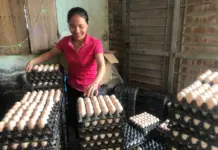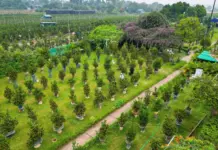Stems of Lepironia articulata, a type of wild grass native to salt-marsh areas in Vietnam, are being used to manufacture straws that are becoming increasingly popular within luxury restaurants and are favored by many foreign customers.
Lepironia articulata can be found in the southern provinces of Dong Thap, Long An, and Kien Giang. This species of sedge is native to tropical wetlands and is an integral part of the region’s rich biodiversity. It is used both for food and for medicinal purposes, and its presence is important for maintaining the health of local ecosystems.
Local residents use the plant to create beautiful, handmade crafts. From intricately woven baskets to decorative trinkets and sculptures, the plant provides a great source of materials for these one-of-a-kind creations.
Phan Tan Phat, director of ECO PTP Trading and Producing Co. Ltd., has transformed single-use plastic straws into eco-friendly alternatives. This ingenious move has enabled the company to reduce the amount of plastic waste entering the environment.
Launch a Business with Wild Grasses
Starting a business with wild grasses is a great way to diversify your income stream and make a difference in the environment. Wild grasses are an abundant, renewable resource that can be used for a variety of applications, from landscaping to forage for livestock. With a little bit of know-how and the right resources, you can start a business with wild grasses that will not only generate income but also help protect and preserve our environment.
To get started, you’ll need to do some research on the types of wild grasses available in your area. You’ll also need to determine what you want to use the grasses for, such as landscaping or forage. Once you’ve identified a suitable grass species, you will need to obtain a permit from your local municipality or the state Department of Natural Resources. With a permit in hand, you can begin to collect and cultivate wild grasses.
Next, you will need to develop a business plan, including a budget for supplies, labor, and marketing. You will also need to consider the costs of storing and transporting the grasses. Once you have a plan in place, you can begin to collect wild grasses and prepare them for sale.
Finally, you will need to market your business and your product. You can reach out to local landscaping companies, farmers, and other businesses that may be interested in purchasing the wild grasses you collect. You can also use online platforms to sell your product directly to consumers.
By launching a business with wild grasses, you can make a difference in the environment while also creating a unique and profitable income stream. With the right resources and a bit of know-how, you can start a business with wild grasses that will benefit both you and the environment.
Mature Lepironia articulata trees are often one meter high and have hollow stems, making them ideal for producing straws. Their size and hollowed-out structure make them an excellent choice for this purpose.
Phat, born in Binh Thanh Trung Commune, Lap Vo District, Dong Thap Province, holds a university degree in accounting and has previously worked in both Dong Thap and other provinces.
During a business trip to the stunning north of Vietnam, he saw eco-friendly bamboo straws being used in a restaurant and he instantly fell in love with them.
He discovered that customers are increasingly choosing eco-friendly products.
He started thinking about his startup. He wanted to take advantage of local materials to develop a product for his business, though he wasn’t sure what to do at the time.
At that time, Dong Thap Province had straws made of rice flour with various types and designs.
Phat recalled that fresh lepironia articulata straws were quite popular in Ho Chi Minh City but rare in Dong Thap.
Therefore, he collected Lepironia articulata in Dong Thap. Unsatisfied with the amount he had collected, he traveled to Long An and Kien Giang Provinces to buy more, thus turning his start-up idea into a reality.
“The product is crafted by hand,” Phat said. “We use cutting machines and dryers to finish the straws.”
When making the decision to quit his stable job and start his own business in his homeland, Phat was filled with worry, as the specifics of his business idea were still unclear.
He had to meticulously analyze the expenses for machinery, materials, packaging, and applications for permits.
Grass straws require a large volume of materials to produce. In order to create approximately 300 straws of a quality that can be sold for VND350-400, or more than 1 U.S. cent each, approximately 250–300 Lepironia articulata trees are needed.
Lepironia articulata stems are thoroughly washed and then cut into pieces. After that, they are classified, dried, polished and finally packaged for sale.
Except for the drying and cutting steps, the remaining steps of the process are performed manually by approximately ten people.
Frankly speaking, Phat ventured into the business, despite having no money of his own. In fact, the required capital was at least VND200 million ($8,462), which he had to borrow from his relatives.
After surveying the market and customers’ demand, he strategically introduced his product on social media in order to popularize the product.
Thanks to my strong relationships, I have been able to offer my product to high-end restaurants and hotels.
As a result, grass straws have become increasingly popular amongst foreign travelers. Many American customers have visited Phat’s company and purchased the product, highlighting the demand for this eco-friendly alternative.
High Export Potential – Companies of all sizes have the potential to benefit from exporting their goods and services to other countries. With the right strategies and adequate research, businesses can maximize their export potential and increase their chances of success in new markets. Investing in international marketing and business development can help companies reach new customers and open up new revenue streams. By taking steps to reduce risk and develop an understanding of foreign markets, businesses can take advantage of the high export potential that exists in today’s global economy.
His company produces 50,000-100,000 straws per month to meet customer demands. In 2022, they supplied approximately two million straws to the market, with half of them being exported to the U.S. and Europe.
Tran Thi Cam, the Deputy Head of the Economy-Infrastructure Division of Lap Vo District, has expressed her opinion that the product is quite new but is already meeting the demands of some customer groups and has the potential for export. With this in mind, she believes it has a promising future.
This locally-produced product has attracted great attention from the local area and is receiving strong support. The startup behind the product is proud to have its creation embraced by the local community.
As the main material for the product in the province is not sufficient to meet the demand, it must be sourced from other provinces, meaning it is not eligible for One Commune, One Product (OCOP) program.
“Nevertheless,” Cam proclaimed, “this is good news for local economic development!”
Like us on Facebook or follow us on Twitter to stay up to date with the latest news from Vietnam!
Bac Giang applies technology to lychee exports to Japan
The northern province of Bac Giang is now entering into its lychee harvest. In addition to its traditional markets, this year it is also expected to ship its first batch of lychee to Japan, in early June.
Locations Leading the Way in Eco-Friendly Tourism in Vietnam
Pollution and waste is a worldwide issue — 91% of the global population is exposed to unhealthy levels. In Vietnam, a country that relies heavily on agriculture and farming, it is extremely important to look after the land and the air we breathe. The responsibility is on local businesses as well as individuals to make sure that they are doing their utmost to look after the planet.









